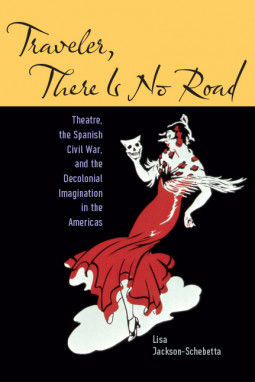
Traveler, There Is No Road
Theatre, the Spanish Civil War, and the Decolonial Imagination in the Americas
by Lisa Jackson-Schebetta
This title was previously available on NetGalley and is now archived.
Send NetGalley books directly to your Kindle or Kindle app
1
To read on a Kindle or Kindle app, please add kindle@netgalley.com as an approved email address to receive files in your Amazon account. Click here for step-by-step instructions.
2
Also find your Kindle email address within your Amazon account, and enter it here.
Pub Date Jun 15 2017 | Archive Date Jun 15 2017
University of Iowa Press | Studies in Theatre History and Culture
Description
This book offers a unique perspective on 1930s theatre and performance, encompassing the theatrical work of the Cuban, Puerto Rican, and Spanish diasporas in the United States, as well as the better-known Anglophone communities. Jackson-Schebetta situates well-known figures, such as Langston Hughes and Clifford Odets, alongside lesser-known ones, such as Erasmo Vando, Franca de Armiño, and Manuel Aparicio. The milicianas, female soldiers of the Spanish Republic, stride on stage alongside the male fighters of the Lincoln Brigade. They and many others used the multiple visions of Spain forged during the civil war to foment decolonial practices across the pasts, presents, and futures of the Americas. Traveler conclusively demonstrates that theatre and performance scholars must position US performances within the Americas writ broadly, and in doing so they must recognize the centrality of the hemisphere’s longest-lived colonial power, Spain.
Advance Praise
“With considerable imaginative verve and intellectual breadth, Traveler, There Is No Roadinvestigates several unheralded dimensions of both Spain and the Spanish Civil War.”—Lloyd Hughes Davies, Swansea University
“This compelling text uses the frame of the Spanish Civil War as a concrete site to generate productive intersections between the discourse of the ‘circum-Atlantic’ and the hemispheric. Traveler, There Is No Road demonstrates the complexities of Spain’s position in Europe and its crucial, lingering influence in a political and cultural understanding of the Americas. Spain becomes a central site for a shifting understandings of the legacies of European colonialism.”—Jon D. Rossini, University of California, Davis
Available Editions
| EDITION | Paperback |
| ISBN | 9781609384906 |
| PRICE | $65.00 (USD) |
| PAGES | 252 |



